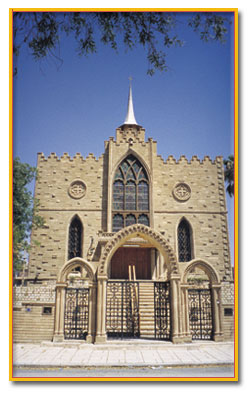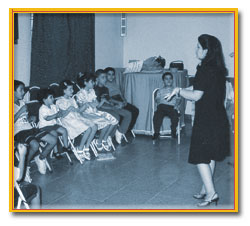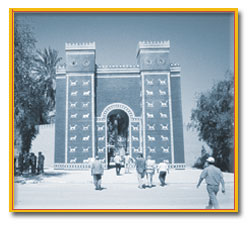 n response to urgent religious liberty issues in Iraq the General Conference
dispatched Mitchell Tyner, an associate general counsel, to Baghdad to meet with officials from the Coalition Provisional Authority, which currently governs the country. Review managing editor Steve Chavez and news editor Carlos Medley talked with Tyner upon his return. We now share his report. --Editor's Note.
n response to urgent religious liberty issues in Iraq the General Conference
dispatched Mitchell Tyner, an associate general counsel, to Baghdad to meet with officials from the Coalition Provisional Authority, which currently governs the country. Review managing editor Steve Chavez and news editor Carlos Medley talked with Tyner upon his return. We now share his report. --Editor's Note.
AR: Why did you go to Iraq?
MT: We received an e-mail from Homer Trecartin, Middle East Union secretary-treasurer, asking us to become involved in Iraq because Adventist students are being required to take school exams on the Sabbath. We did as much homework as we could over here and found out that communication was extremely difficult.
So we-my wife, Patsy, and I-took off for Iraq. There are no scheduled flights into Iraq. You have two ways to get there; you can go overland, either from Kuwait or Amman [in Jordan]. Or there is an air option, an operation called AirServ, that exists to transport the staff of nongovernment organizations and relief agencies in and out of Baghdad.
We left the United States on a Thursday evening, changed planes in Paris, and got to Amman on Friday evening. We worshiped with the Amman church on Sabbath morning. We've known the Amman church for years because of our participation in archaeological digs.
On Sunday morning we went out to the Markha airfield, an old airport that is now used for general aviation, boarded a Beechcraft D1900, and took off across the desert to Baghdad.
An interesting aspect of the flight is that you don't follow a normal, gradual glide slope: you come over the Baghdad airport at 15,000 feet and corkscrew [spiral] down, to avoid low altitudes until in secure airspace.
We heard an American general describe coming in on a military plane too large to do the corkscrew approach. He was obviously very worried about the possibility of the plane being hit by a missile or a rocket-propelled grenade.
When you get on the ground, you don't go to the passenger terminal, which is not in use. You taxi down to the end of the runway to a hangar that the military uses as a postal facility. Mountains of mail in there. Military police officers from the U.S. Army's First Armored Division are doing duty as baggage handlers. I told them they were so good they ought to take over the baggage operation at the Miami airport.
You're processed in, your picture is taken, and your passport is entered into a computer log. Then you sit down in a waiting area that is filled with marvelously ornate furniture, gilt, ormolu, inlay, nice big porcelains, all from one of Saddam's palaces.
Roughly an hour and a half later Adventist Development and Relief Agency [ADRA]/Iraq director Tom Benton comes in. He arrived just [in Iraq] about 10 days before us, and this was his first trip to the airport. He had been stopped at the checkpoint on the highway to the airport and was delayed an hour on his way to pick us up.
 Whom did you meet with once you got there?
Whom did you meet with once you got there?
First I met with Basim Fargo, the secretary-treasurer of the Iraq Field. They haven't had a pastor in Baghdad for some time. The president of the field is also the union president, who lives in Cyprus. Basim, a businessperson by background and a committed lifelong, multigeneration church member, has stepped forward and is the administration of the church for all practical purposes. The denomination is much in his debt for holding things together so well in a very tense time. Basim gave me the background of the problem and what he felt we could do about it.
Basim had set up a meeting for me the next morning with representatives of all the religious groups in Iraq-
Catholic, Orthodox, Protestant, Muslim-in our church office. Incidentally, our church in Baghdad is very well thought of and respected, largely through the contacts and example of the Fargo family.
During the meeting we talked about the problems each religious group is having, and what they might need from the Coalition Provisional Authority [CPA], which is the closest thing to a government that now exists in Iraq.
In addition to our problem with exams on Sabbath, it was clear that a high priority item for several faith groups is permission to reopen schools that Saddam closed over the past several years. And there are other problems: There are five evangelical groups led by the Presbyterians that want to merge but can't do so because they can't get government approval. After all, there is no government at the moment to give approval.
There are also problems involving the status of minor children. In Islamic countries a minor child of a Muslim father is assumed to be Muslim. The Christian groups all want a situation in which the child, at his or her eighteenth birthday, can choose what she or he wants to be. And there are problems with religion classes in public schools, Christian kids sometimes being forced to sit in on Islamic theology classes.
How many religious groups were involved in this meeting?
Eight. I was the only Westerner.
You met the patriarch of the Chaldean Catholic Church in Iraq?
One person I had been advised to see was Archbishop Delly of Bagdad, the acting Chaldean patriarch. He's a person of influence in the area of government relations with religious bodies, even though he has only three percent of the population. Ninety-five percent of Iraq's population is Muslim, and five percent is Christian. And out of the five percent, three percent is Catholic, which leaves only two percent for all others combined.
Our meeting with the patriarch was arranged through Basim Fargo's uncle, Ghanem Fargo, a man of business and a personal friend of the patriarch. The patriarch was very supportive of our efforts. He gave me a copy of the presentation that he has already given to the CPA as to what they want in a new constitution, and it is something with which we are comfortable.
We then made contact with Michael Rubin, constitutional liaison and political advisor to Paul Bremer at the CPA. We knew in advance that he was someone who would be sympathetic to our problem. We presented him with the list of concerns generated by our meeting with the representatives of religious groups, and he responded forthrightly on each item. He then put us in communication with other people in the CPA who could assist us.
Regarding the reopening of religious schools that Saddam had closed, we were told that the administration is in favor of diversity of education and that such permission is a matter of time. But as Rubin put it, "We do have other priorities first. They're still shooting at us and things like that."
As to the merger of the Protestant groups, it's just a matter of getting a governmental authority in place that can give the approval. Regarding both the exemption of Christian students from Islamic theology classes and the religious status of minors, Rubin said, "What you're asking is already the law. It's just a matter of getting the courts up and running and seeing that the law is enforced."
What about Adventist students being required to take exams on Saturday?
Weekly classes and exams given in individual schools have already been worked out. The Ministry of Education has already mandated that accommodation. The remaining problem is standardized tests given by the ministry twice yearly in July and September for entrance into the tenth and twelfth grades. The exams are the same at both times, providing students with two opportunities to pass. They're given on two tracks: Monday, Wednesday, Saturday; and Sunday, Tuesday, Thursday; obviously, none on Friday.
 We saw a simple solution: swap the schedules for the second set of exams, so that the subjects that were examined on Saturday in July would be on the Sunday-Tuesday-Thursday schedule in September. That would accommodate both Saturday and Sunday.
We saw a simple solution: swap the schedules for the second set of exams, so that the subjects that were examined on Saturday in July would be on the Sunday-Tuesday-Thursday schedule in September. That would accommodate both Saturday and Sunday.
It sounded too easy, meaning that the bureaucratic mind would surely find an objection. Rubin agreed with our idea: "Sure, that ought to be workable." The following day he requested James Nelson, in the Ministry of Education, to assist us. We then started gathering the identities of all the affected students, along with their school and grade level. We put this in a tabular form, e-mailed it to both Rubin and Nelson, and suggested every method of accommodation we could think of.
Since that time we have been advised of some progress: First, of the two Sabbaths involved, one will be used for the test in Islam, an exam not required of Christian students, so we are down to a problem of one day. Next, we have been told that the schedule for this year has already been set and is too close to implementation to change in the circumstances. We then requested that our students be allowed to take the exams at a separate time, with any expense being covered by the church. We do not yet have a final answer to that request.
The congregation in Baghdad, what is their faith like?
Remarkably strong. To get to church, these people cope with out-of-control traffic, erratic public transportation, chaos, noise, heat, and personal danger. When you enter their church, it's like walking into an oasis. It is quiet, it is clean, it is cool, it is reverent. The people were happy. They greeted one another as friends do at any Adventist church anywhere else in the world. This is a real, live faith community. It's self-supporting, self-sustaining. I found it very reassuring, frankly.
Are there other Adventist congregations in the country?
In theory, there are congregations in Mosul, Kirkuk, and Basra. At present only the Baghdad church is functioning regularly.
Do you know roughly how many Adventists are in the whole country?
About 250.
How about Iraqi Adventists in terms of the military? Did they have to serve in Saddam's army?
They were allowed to do alternative service. And now there is no Iraqi army. Ironic, isn't it? Most of the Adventists in Iraq right now are in the U.S. Army.
Is it easy to get around in Baghdad?
No. Traffic is total chaos. I saw three or four patrol cars, half a dozen police doing an ineffective job, and nobody paying any attention to them. Otherwise, traffic in a city of several million people is on its own-no regulation, no protection.
I noticed from the start that Basim Fargo drove very carefully, very slowly. He has a good reason. As he said, "If you break it, you can't fix it." There are no spare parts, no repair shops open. If you get in an accident, you have a problem.
Tell us about your trip to Babylon.
It's difficult to do anything in an Islamic country on Friday, so at the end of the week Basim said, "Let's run down to Babylon." So we piled in the car and took off to Babylon.
It's interesting to stand in Belshazzar's dining hall and think of the handwriting on the wall. Much of Babylon is heavily restored, and sometimes it's hard to tell what is ancient and what is not. There are two sets of inscribed bricks in those walls. In the old section you'll find a few bricks with a cuneiform inscription that says something like, "Nebuchadnezzar built this." Then a bit farther up, in the restored section, there's an inscription in Arabic that says, "Saddam Hussein built this."
How do the Iraqi people feel about Americans?
At Babylon I was gratified to see the Marines relating very well to kids and shopkeepers who wanted to set up a little market right outside the gate of the base. I thought they were doing a remarkably good job.
On the other hand, the First Armored Division, guarding Baghdad, is in a very difficult situation. Two of them are dying every day, on average, and they understandably see every person as a potential enemy. But especially in the Middle East, if you treat me as your enemy long enough, I will be your enemy.
You asked me what the people think. The reaction of those I talked to came down to this: "Thank you for getting rid of Saddam. Now, when are you going home? The sooner the better."
What was the state of mind of our members concerning the war and its aftereffects?
Two things: First, they learned to survive under Saddam. The way you do that is by keeping a low profile. They don't talk about sensitive matters.
 Second, they are a bit shell-shocked. This has been tough. It's not just the war; there were 12 years of sanctions before that.
Second, they are a bit shell-shocked. This has been tough. It's not just the war; there were 12 years of sanctions before that.
It's important to note that no church member has been physically harmed. But many of them have lost jobs. No church family has been untouched financially by the war and its aftermath. Many of them are living week to week, and it's a precarious existence.
An example of the financial situation our members face: The ADRA driver and I were waiting for Michael Rubin outside the CPA, sitting in the driver's Toyota. He told me that he had bought it just before the war for 2,000 Iraqi dinars. Two thousand dinars is now worth US$1.33.
Did you get a feel for when a constitution might be put into place?
The target I heard was the summer of 2004. But a lot of other things must be done first.
Do you see the Adventist Church being involved in the process long-term?
We have been promised the opportunity for input and will certainly follow up on that promise.
Did you preach at the church?
Yes, and it was a memorable experience, worshiping with people in that circumstance. Sabbath afternoon was almost unreal. We went to the Fargos' home and had lunch with the extended family and friends. After lunch, in a war zone, we sat around watching 3ABN by satellite!
How were you received as an American?
There has to be ambivalence. I always make it plain that I represent the Seventh-day Adventist Church, not the United States government. And yet I am an American. Nobody would ever mistake me for anything else. Iraqis must see me as one of those people who have been causing them problems, through the embargo, for the past 12 years.
Does the local church feel supported by the worldwide church?
I think they are well aware of the global church's interest in them. They feel very much a part of the church.
Is there anything that Adventists outside of Iraq can do to help?
One thing they can do right now is to contact their congressperson or other government representative and make it very plain that they have a very strong interest in providing Iraq with a constitutional form of government that guarantees religious equality and freedom.
More Religious News
Adventist News Network
Religion News Service
Religion Today


